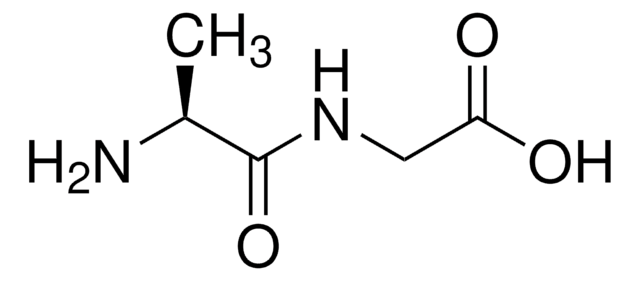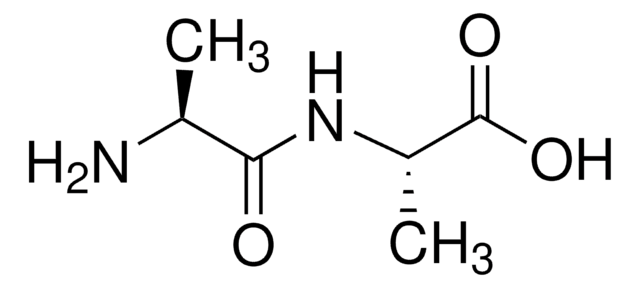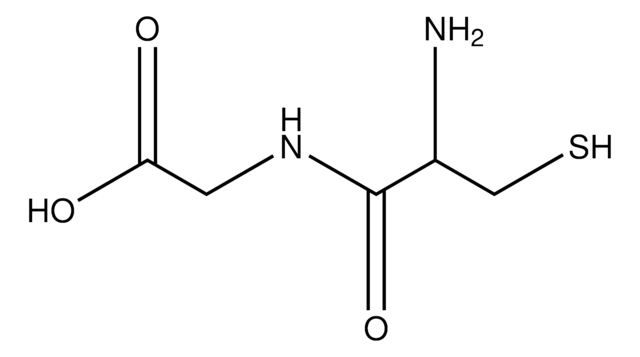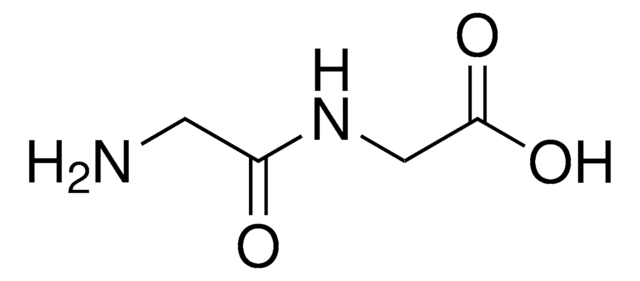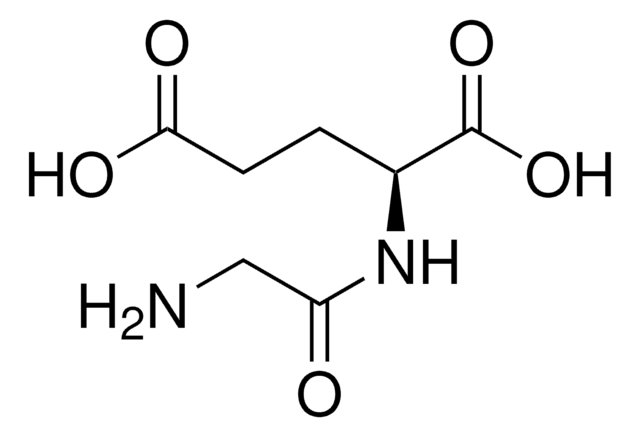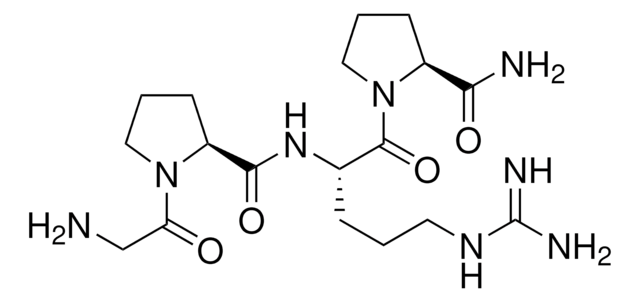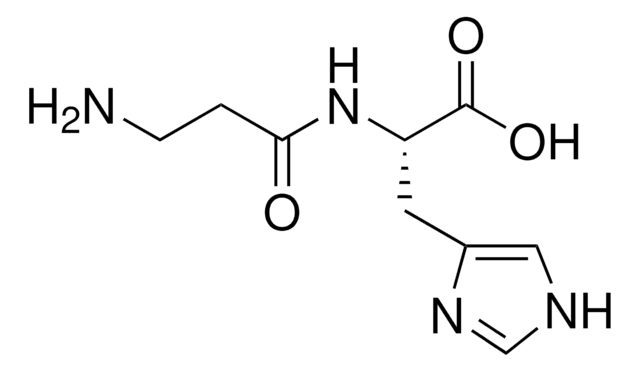G4541
Gly-Gly-His
≥98% (TLC)
Synonym(e):
Copper-binding peptide
Anmeldenzur Ansicht organisationsspezifischer und vertraglich vereinbarter Preise
Alle Fotos(1)
About This Item
Empirische Formel (Hill-System):
C10H15N5O4
CAS-Nummer:
Molekulargewicht:
269.26
MDL-Nummer:
UNSPSC-Code:
12352209
NACRES:
NA.26
Empfohlene Produkte
Produktbezeichnung
Gly-Gly-His,
Assay
≥98% (TLC)
Qualitätsniveau
Form
solid
Farbe
white
Lagertemp.
−20°C
InChI
1S/C10H15N5O4/c11-2-8(16)13-4-9(17)15-7(10(18)19)1-6-3-12-5-14-6/h3,5,7H,1-2,4,11H2,(H,12,14)(H,13,16)(H,15,17)(H,18,19)
InChIKey
PDAWDNVHMUKWJR-UHFFFAOYSA-N
Verwandte Kategorien
Amino Acid Sequence
Gly-Gly-His
Allgemeine Beschreibung
Gly-Gly-His (GGH) tripeptide with carboxyl-terminal histidine residue is hydrophilic.
Anwendung
Gly-Gly-His has been used:
- as a peptide test probe in the hydrophilic interaction liquid chromatography (HILIC) studies
- in the electrochemical modification of back-side contact transducers (BSC) electrodes in copper (Cu2+) sensing studies
- for the fabrication carbon nanotube electrode for detection of Cu2+ ions
Biochem./physiol. Wirkung
Gly-Gly-His (GGH) tripeptide displays the affinity of copper (Cu2+) complexation. These complexes display good skin tolerance and may be useful in wound healing. GGH copper complexes are proposed to reduce tumor necrosis factor α (TNF-α)-based interleukin 6 (IL-6) secretion by in vivo studies with fibroblasts. GGH is used in comparative studies with other imidazole-containing peptides such as carnosine. An area of active application research involves the GGH binding of copper ions.
Lagerklassenschlüssel
11 - Combustible Solids
WGK
WGK 3
Flammpunkt (°F)
Not applicable
Flammpunkt (°C)
Not applicable
Persönliche Schutzausrüstung
Eyeshields, Gloves, type N95 (US)
Hier finden Sie alle aktuellen Versionen:
Besitzen Sie dieses Produkt bereits?
In der Dokumentenbibliothek finden Sie die Dokumentation zu den Produkten, die Sie kürzlich erworben haben.
Kunden haben sich ebenfalls angesehen
Meng Lin et al.
Biosensors & bioelectronics, 26(2), 940-945 (2010-07-16)
We developed a novel biosensor comprising a transducer of carboxyl end-capped overoxidized polypyrrole nanowire electrode and a probe of tripeptide (Gly-Gly-His) selectively cognitive of Cu2+. The developed sensor was demonstrated to specifically detect Cu2+ in the nanomolar range. The diameter
Emrys A Jones et al.
Journal of the American Society for Mass Spectrometry, 18(8), 1559-1567 (2007-07-03)
Through analyzing mixtures of compounds of known gas-phase basicities, the importance of this property on the secondary ions emitted from a surface under primary ion bombardment is investigated. The aim is to obtain a greater understanding of the ionization mechanisms
Meng Lin et al.
Analytica chimica acta, 746, 63-69 (2012-09-15)
A novel electrochemical biosensor based on functionalized polypyrrole (PPy) nanotube arrays modified with a tripeptide (Gly-Gly-His) proved to be highly effective for electrochemical analysis of copper ions (Cu(2+)). The vertically oriented PPy nanotube arrays were electropolymerized by using modified zinc
Jeff C Joyner et al.
Chemical communications (Cambridge, England), 49(21), 2118-2120 (2013-02-06)
Metallopeptides containing both the complex Cu(2+)-glycyl-glycyl-histidine (Cu-GGH) and the sequence WRWYCR were shown to possess antimicrobial activity against a variety of pathogenic bacteria, as well as bind to and cleave a variety of nucleic acids, suggesting potential mechanisms for antimicrobial
X Shi et al.
Chemical research in toxicology, 6(3), 277-283 (1993-05-01)
Electron spin resonance spin trapping was utilized to investigate the generation of free radicals from cumene hydroperoxide (cumene-OOH), tert-butyl hydroperoxide (tert-butyl-OOH), and H2O2 at pH 7.2 by Co(II) in the presence of cysteinyl and histidyl chelating agents. The spin trap
Unser Team von Wissenschaftlern verfügt über Erfahrung in allen Forschungsbereichen einschließlich Life Science, Materialwissenschaften, chemischer Synthese, Chromatographie, Analytik und vielen mehr..
Setzen Sie sich mit dem technischen Dienst in Verbindung.